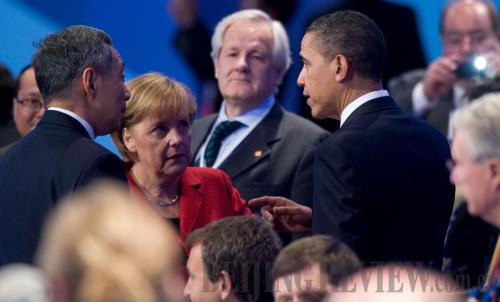|
An incremental approach
 |
|
A SAFEGUARDING SUMMIT: U.S. President Barack Obama talks with German Chancellor Angela Merkel and Singapore's Prime Minister Lee Hsien Loong at the Nuclear Security Summit in Washington, D.C. on April 13 (XINHUA/AFP) | Prior to the summit, many American academics and analysts expected to see a new—and more binding—international nuclear security framework established at the summit. But Obama gave up his efforts to achieve this elusive goal.
Instead, in his closing speech, the 44th U.S. president emphasized that Washington did not need new mechanisms or overlapping institutions—but that it did need to strengthen the existing mechanisms and cooperative relations, making them more effective.
This provided another excellent example of the "smart power" of Obama's international diplomacy.
Indeed, nuclear security involves many aspects—from nuclear weapons themselves to nuclear materials, facilities and technologies.
But as the security of nuclear weapons is a highly sensitive subject, most nuclear states have avoided discussing it altogether. This, of course, is a highly disturbing trend.
The security of nuclear technologies, meanwhile, might lead to restrictions on fuel cycle technologies—a sensitive part for the peaceful use of nuclear energy under the Nuclear Non-Proliferation Treaty. Therefore, the summit restricted in the very concept of "nuclear security" within the scope of protecting nuclear materials while preventing nuclear trafficking, so as to reduce resistance to cooperation as much as possible.
In the interest of reaching a consensus, the United States has actively adopted multilateral diplomacy. Due to its efforts, Ukraine, Mexico and other developing countries have pledged to surrender their stocks of highly enriched uranium, thus making the summit more fruitful.
The subject of nuclear security is hardly a new one. The September 11 attacks by Al Qaeda terrorists were, among other things, a huge motivator for the international community in this regard. This can be seen in the new and frequent establishment of cooperation mechanisms.
Take UN Security Council Resolution 1540, passed in April 2004. It highlighted the risk of the proliferation of weapons of mass destruction to non-state actors. Meanwhile, it laid the groundwork for the 1540 Committee, which requires member states to regularly report their progress in implementing the resolution.
The next year, the UN General Assembly passed the International Convention for the Suppression of Acts of Nuclear Terrorism. The convention offered a comprehensive definition of acts of nuclear terrorism, while requiring member states to undertake various measures to prevent the threat of nuclear terrorism.
The IAEA has also done its share to ensure the security of nuclear materials. It has formulated a number of nuclear security guidelines, while amending the Convention on the Physical Protection of Nuclear Material.
The United States, for its part, has launched the Global Threat Reduction Initiative and the Global Initiative to Combat Nuclear Terrorism, along with other multilateral frameworks. In addition, the Group of Eight has initiated the Global Partnership Against the Spread of Weapons and Materials of Mass Destruction.
These mechanisms have played a positive role in the promotion of international nuclear security cooperation. But the problem here is a lack of cohesiveness—as well as other shortcomings.
The IAEA is mainly limited to providing suggestions. So far, only a few countries have approved the agency's Amendment to the Convention on the Physical Protection of Nuclear Material. And the multilateral mechanisms proposed by the United States have yet to achieve a broad participation.
So the Nuclear Security Summit was an extremely positive development in that it provided a platform for a full integration of current mechanisms and frameworks.
The work plan issued at the summit emphasized the important role of the mechanisms mentioned above one by one. This proved the integration of existing mechanisms will play a key role in the current international nuclear security cooperation.
Multi-tiered mechanisms
At the opening of the Washington event, Obama announced that the next summit would be held in South Korea in 2012. This shows the international nuclear security cooperation mechanism may become part of a permanent, long-term framework. Furthermore, the very location of the next summit will also facilitate the United States' leading role at the summit.
This event also indicated that the links between non-proliferation and nuclear security may be further strengthened. As non-proliferation and antiterrorism share increasingly similar objectives and means, moreover, related mechanisms of the two may well integrate in the future.
The international media expressed dismay that representatives from North Korea and Iran were not invited to this gathering. At the next summit in South Korea, non-proliferation will naturally be the key topic. And at that time, the United States is unlikely to use the opportunity to impose pressure on these two nations, while carrying out its non-proliferation purpose.
While announcing the host of the next summit, Obama also lauded the South Koreans for what he called their "leadership regionally and globally."
In addition to hosting the preparatory meeting for the first summit, Japan declared its intention to lead regional nuclear security cooperation. This wish was also echoed by the UK and India.
Future international cooperation will likely be conducted through multi-tiered mechanisms grounded in the nuclear security summits, with UN resolutions and conventions and the IAEA playing leading roles. At the same time, a number of regional nuclear security mechanisms will play supporting roles.
The author is an assistant research fellow with the Institute of Arms Control and Security Studies at the China Institutes of Contemporary International Relations
| 